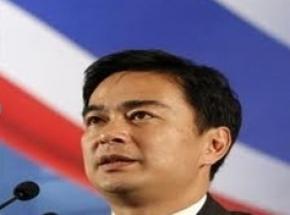ID :
160567
Sun, 02/13/2011 - 09:35
Auther :
Shortlink :
http://m.oananews.org//node/160567
The shortlink copeid
Thai PM insists on solving Thai-Cambodian problems through bilateral negotiation

BANGKOK, Feb 13 (TNA) - Thai Prime Minister Abhisit Vejjajiva insisted on Sunday (Feb 13) that the Thai government will use bilateral mechanism to solve conflicts with Cambodia. He also urged the United Nations Educational, Scientific and Cultural Organization (UNESCO) and the World Heritage Committee to halt any plan to manage the vicinity of the Preah Vihear temple.
Abhisit said Thailand was complying with the principle of the Association or Southeast Asian Nations (ASEAN) that member countries would resolve their conflicts through bilateral negotiation which would ensure the best mutual interest and true peace. ASEAN foreign ministers will meet on February 22 to push for the negotiation although Cambodia is strongly refusing to enter into bilateral negotiation.
The Thai prime minister reiterated that conflicts between Thailand and Cambodia resulted from the listing of the Preah Vihear temple as a World Heritage site. He said that the conflicts could be solved through bilateral negotiation on their demarcation. In the meantime, he said, UNESCO and the World Heritage Committee must relieve pressures on both Cambodia and Thailand by stopping the process of any plan to manage the vicinity of the Preah Vihear temple that is the source of the conflicts.
At this stage, according to the Thai premier, Thailand has its Foreign Minister Kasit Piromya fly to New York to explain the issue to the United Nations Security Council (UNSC) on February 14. The foreign minister will attend the UNSC meeting together with his Indonesian counterpart as Indonesia is the chair of ASEAN and with his Cambodian counterpart.
Meanwhile, Suvit Khunkitti, the Thai Minister of Natural Resources and Environment, and Asda Jayanama, the Thai chair of the Thai-Cambodian Joint Boundary Commission (JBC), have left to meet the UNESCO director-general to explain the issue and ask UNESCO to suspend any plan to manage the vicinity of the Preah Vihear temple until Thailand and Cambodia complete their demarcation.
The Thai prime minister expressed his confidence by saying that Thailand had enough evidence to prove facts relating to Thai-Cambodian conflicts to UNSC, UNESCO, the World Heritage Committee and the international community.
Meanwhile, the Thai Department of Mental Health Director-General Apichai Mongkol said the department had conducted mental health surveys of evacuees at evacuation camps following weeks of intensified tension along Thai-Cambodian border and found no evacuees with severe distress and depression.
Most of mental health problems occurred to evacuees after the evacuation is mild distress and depression. They are worried about their living, food, and the border situation and none is required to receive treatment or stress-relief pills.
According to the survey of the people in northeastern hospitals, on average 20 people out of 1,500 people are found to have mild depression and approximately 4-5 people need times for adaptation.
However, the Department of Mental Health Director-General believes that the situation has improved after the authority gave permission for villagers to return home. (TNA)
Abhisit said Thailand was complying with the principle of the Association or Southeast Asian Nations (ASEAN) that member countries would resolve their conflicts through bilateral negotiation which would ensure the best mutual interest and true peace. ASEAN foreign ministers will meet on February 22 to push for the negotiation although Cambodia is strongly refusing to enter into bilateral negotiation.
The Thai prime minister reiterated that conflicts between Thailand and Cambodia resulted from the listing of the Preah Vihear temple as a World Heritage site. He said that the conflicts could be solved through bilateral negotiation on their demarcation. In the meantime, he said, UNESCO and the World Heritage Committee must relieve pressures on both Cambodia and Thailand by stopping the process of any plan to manage the vicinity of the Preah Vihear temple that is the source of the conflicts.
At this stage, according to the Thai premier, Thailand has its Foreign Minister Kasit Piromya fly to New York to explain the issue to the United Nations Security Council (UNSC) on February 14. The foreign minister will attend the UNSC meeting together with his Indonesian counterpart as Indonesia is the chair of ASEAN and with his Cambodian counterpart.
Meanwhile, Suvit Khunkitti, the Thai Minister of Natural Resources and Environment, and Asda Jayanama, the Thai chair of the Thai-Cambodian Joint Boundary Commission (JBC), have left to meet the UNESCO director-general to explain the issue and ask UNESCO to suspend any plan to manage the vicinity of the Preah Vihear temple until Thailand and Cambodia complete their demarcation.
The Thai prime minister expressed his confidence by saying that Thailand had enough evidence to prove facts relating to Thai-Cambodian conflicts to UNSC, UNESCO, the World Heritage Committee and the international community.
Meanwhile, the Thai Department of Mental Health Director-General Apichai Mongkol said the department had conducted mental health surveys of evacuees at evacuation camps following weeks of intensified tension along Thai-Cambodian border and found no evacuees with severe distress and depression.
Most of mental health problems occurred to evacuees after the evacuation is mild distress and depression. They are worried about their living, food, and the border situation and none is required to receive treatment or stress-relief pills.
According to the survey of the people in northeastern hospitals, on average 20 people out of 1,500 people are found to have mild depression and approximately 4-5 people need times for adaptation.
However, the Department of Mental Health Director-General believes that the situation has improved after the authority gave permission for villagers to return home. (TNA)





